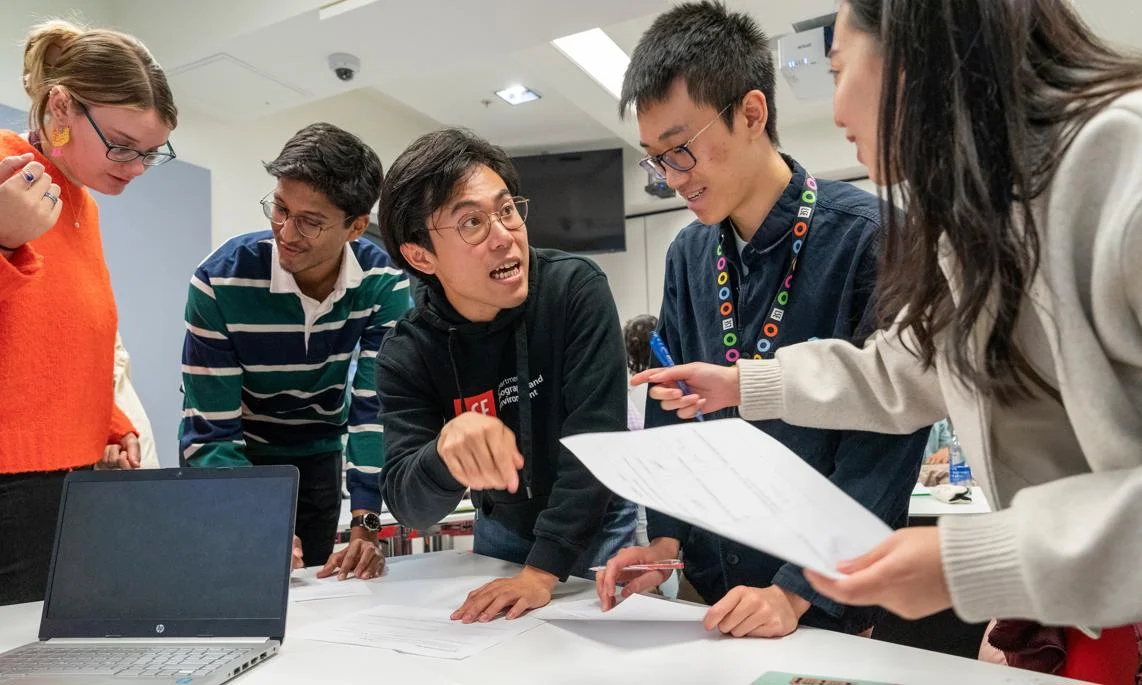Overview
Introduction
Sciences Po and LSE have come together to offer this distinctive dual degree devoted to urban management and policy, which combines the strengths of two leading international centres of research in city development and urban governance.
The double degree lasts two academic years: the first year is spent at Sciences Po, in the Master Stratégies Territoriales et Urbaines; the second year is spent at LSE, following one of two MSc programmes, in either Local Economic Development or Regional and Urban Planning Studies.
Spanning a wide range of disciplines, including public management, economic development, urbanisation, project management, urban social analysis, and planning, this selective bilingual (French and English) programme will enable you to develop an understanding of the political, economic and social issues raised by contemporary urbanisation, at local and international levels, with a curriculum focused on the analytic tools used in the field of urban policy.
On completion, you'll be awarded a master's from Sciences Po in Stratégies Territoriales et Urbaines, and an MSc from LSE in Urban Policy.
Preliminary readings
Regional and Urban Planning Studies reading
- P Hall Cities of Tomorrow: An Intellectual History of Urban Planning and Design in the 20th Century (Wiley Blackwell, 2002)
- J Friedmann Insurgencies: Essays in Planning Theory London (Routledge, 2011)
Urbanisation and Development reading
- R Centner Microcitizenships: Fractious Forms of Belonging after Argentine Neoliberalism (International Journal of Urban and Regional Research,36:2, 336-62, 2012)
- S Chant Women, Girls and World Poverty: Empowerment, Equality or Essentialism? (International Development Planning Review, 38:1, 1-24, 2016)
- S Chant and C McIlwaine Cities, Slums and Gender in the Global South:Towards a Feminised Urban Future (Routledge, 2016)
- A G Jones and R Sanyal Spectacle and Suffering: The Mumbai Slum as a Worlded Space (Geoforum, 65, 431-9, 2015)
- L Lees H B Shin and E López-Morales Planetary Gentrification (Polity Press, 2016)
- C Lemanski and C Marx The City in Urban Poverty (Palgrave Macmillan, 2015)
- C Mercer, Landscapes of Extended Ruralisation: Postcolonial Suburbs in Dar es Salaam, Tanzania, (Transactions of the Institute of British Geographers, DOI: 10.1111/tran.12150, 2016)
- H B Shin Economic Transition and Speculative Urbanisation in China: Gentrification Versus Dispossession (Urban Studies, 53:3,471-89, 2016)
- K Ward Researching the City: A Guide for Students (Sage, 2012)
- A Zeiderman Endangered City: The Politics of Security and Risk in Bogotá (Duke University Press, 2016)
Local Economic Development reading
- A Pike A Rodriguez-Pose and Tomaney Local and Regional Development (Routledge, 2016)
- M Storper Keys to the City: How Economics, Institutions, Social Interaction, and Politics Shape Development (Princeton University Press 2013)
Entry requirements
Upper second class honours (2:1) degree or equivalent in any discipline.
Please select your country from the dropdown list below to find out the entry requirements that apply to you. Candidates must meet the entry requirements for both LSE and Sciences Po. For more information about Sciences Po's entry requirements, please visit their website.
Overseas
English language requirements
The English language requirement for this programme is Standard. Read more about our English language requirements.
Competition for places at LSE is strong. So, even if you meet the minimum entry requirements, this doesn't guarantee you an offer of a place.
However, please don’t feel deterred from applying – we want to hear from all suitably qualified students. Think carefully about how you can put together the strongest possible application to help you stand out.
Programme content
Year 1
Year 1, at Sciences Po
At Sciences Po, the academic year runs from early October to the end of June. You'll follow a course of study that covers topics of urban sociology, economics and politics, along with elective courses.
Year 2
Year 2, at LSE
The second year runs from October until September of the following year. It comprises three terms plus a summer period for completion of a dissertation.
You'll follow one of these two alternative lines of specialisation, following the teaching programmes (and course options):
These interdisciplinary programmes have international orientations and are provided through formal teaching. The hours vary but on average you should expect 50 hours of contact time for each of the three taught course units. This accounts for 75 per cent of credits for the year. The remaining credits stem from an independent research dissertation, which you'll develop with a supervisor and complete in July/August.
Why study with us
Discover more about our department below and explore our student testimonials on our website.
Meet the department
Our department is highly regarded both nationally and internationally – ranked second for Geography in the QS World University Rankings 2025.
Here at LSE, we offer a unique opportunity to study geography in a university with a worldwide reputation in the social sciences. We specialise in economic, urban and development geography, environmental social science and climate change, all with a strong emphasis on real-world applications.
Many of our academics are internationally renowned in their fields. You’ll find a good balance of experienced and younger academics in the department. Within the team, we’ve had three holders of the highly prestigious Philip Leverhulme Prize Fellowships for researchers under the age of 36.
Our research is interdisciplinary and international in its scope and we work closely with academics from several other departments at LSE. Teaching staff are active within the following research centres:
- Cañada Blanch Centre for Contemporary Spanish Studies
- Centre for Climate Change Economics and Policy
- Centre for Economic Performance
- Grantham Research Institute on Climate Change and the Environment
- LSE London
- Middle East Centre
- Saw Swee Hock Southeast Asia Centre
- Transition Pathway Initiative Centre
- What Works Centre for Local Economic Growth
Based in the heart of London opposite Lincoln’s Inn Fields, the department offers a lively, welcoming and supportive community for students and staff.
Learn more about our undergraduate, postgraduate and PhD study opportunities, as well as our research.
Why LSE
University of the Year 2025 and 1st in the UK in 2025 and 2026
Times and The Sunday Times - Good University Guide 2025 and 20261st in London for the 14th year running
The Complete University Guide - University League Tables 20266th in the world for the study of social sciences and management
QS World University Rankings by Subject 20256th in the world for leading the way in social and environmental sustainability
QS World University Rankings: Sustainability 2026Your application
Overview
We welcome applications from all suitably qualified prospective students and want to recruit students with the best academic merit, potential and motivation, irrespective of background.
You may need to provide evidence of your English language proficiency. See our English language requirements.
Data sharing
Double degrees and certain other degrees and scholarships require that LSE shares personal data with another university or partner. In our agreements we will use the School’s standard data sharing template for universities and partners in the EU and EEA and in an adequate country. Standard contract clauses will be used for any other country. If you have any questions about this or how your personal data will be treated by LSE, please contact the Data Protection Officer via glpd.info.rights@lse.ac.uk or check our Student Privacy Notice.
Fees and funding
The table of fees shows the latest tuition fees for all programmes.
You're charged a fee for your programme. At LSE, your tuition fee covers registration and examination fees payable to the School, lectures, classes and individual supervision, lectures given at other colleges under intercollegiate arrangements and, under current arrangements, membership of the Students' Union. It doesn't cover living costs or travel or fieldwork.
Home
Year 1 (at Sciences Po, 2026/27):
Home students: visit Sciences Po website
Year 2 (at LSE, 2027/28):
Home students: £20,300 (provisional)
Overseas
Year 1 (at Sciences Po, 2026/27):
Overseas students: visit Sciences Po website
Year 2 (at LSE, 2027/28):
Overseas students: £32,000 (provisional)
Learning and assessment
How you learn
How you're assessed
A dissertation workshop will be held in order to guide and assist you with the writing, completion and submission of your dissertation. The dissertation may be on any topic within the field of the MSc programme studied but approval for the topic must be obtained from the relevant Programme Director prior to starting work on it.
An indication of the formative coursework and summative assessment for each course can be found in the relevant course guide.
Graduate destinations
Overview
This programme provides the opportunity to develop a career focused on local and urban policy in the private, public or international sectors at the highest level. Graduates could be expected to go into positions in local/regional government; urban development, property and planning consultancies; community organisations; investment banks; regeneration agencies; central government urban affairs departments and property development.
Further information on graduate destinations for this programme
Median salary of our graduate taught students 15 months after graduating:
Top 5 sectors our students work in:
Career support
From CV workshops through to careers fairs, LSE offers lots of information and support to help you make that all-important step from education into work.
Many of the UK’s top employers give careers presentations at the School during the year and there are numerous workshops covering topics such as job hunting, managing interviews, writing a cover letter and using LinkedIn.
See LSE Careers for further details.

